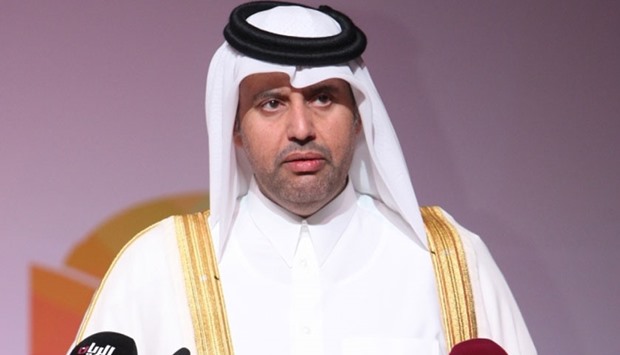HE the Minister of Economy and Commerce Sheikh Ahmed bin Jassim bin Mohamed al-Thani reaffirmed the importance of strengthening investment relations between Qatar and South Africa, especially as both countries share a promising vision and great aspirations in providing stability and prosperity for their peoples.
This came in his opening remarks to the Qatar-South Africa Business Forum held in Pretoria yesterday, which coincided with the visit of HH the Emir Sheikh Tamim bin Hamad al-Thani to South Africa.
The forum was attended by HE the Foreign Minister Sheikh Mohamed bin Abdulrahman al-Thani, HE the Chairman of Qatar Chamber of Commerce and Industry Sheikh Khalifa bin Jassim bin Mohamed al-Thani, along with representatives from the Ministry of Energy and Industry, Qatari Diar company, Widam Food, Katara Hospitality, Qatar Development Bank and Qatar Ports Management Company.
HE the Minister of Economy and Commerce stressed that the two countries have great potential to increase co-operation in various fields, pointing out that the value of Qatar's exports to South Africa reached about $390mn in 2016, while the value of South African exports of goods to Qatar accounted for $104mn.
The Minister noted that the current levels of trade do not reflect the real potential for co-operation between the two countries, especially as Qatar's share of South Africa's total exports is only about 1% and Qatar's share of imports of fuel, chemicals and plastics in South Africa is only 2%.
Touching on economic opportunities available to investors in Qatar, he pointed out that the country has many mega projects in several fields, including schools and hospitals in the education and health sectors, new parks and resorts, electricity and water projects, waste management projects, transport infrastructure projects, food processing, agriculture and fisheries, as well as Lusail city development project, and manufacturing facilities and warehouses.
HE Sheikh Ahmed bin Jassim bin Mohamed al-Thani said that the economic agreements signed between the two sides could be used as a means to connect the economies of the two countries further, given the strength of these agreements and the goals they seek to achieve.
Qatar can be the gateway to the products of South Africa in the common market of the Gulf Co-operation Council countries as well as the Greater Arab Free Trade Area, he said, adding that Qatari nationals can invest in competitive sectors in South Africa, particularly in the areas of tourism, precious stones and agribusiness.
Commenting on the business environment and investment opportunities available in Qatar, HE the Minister of Economy and Commerce pointed to the important strategic location of the country which enhanced its attractiveness to investments, underling its advanced infrastructure and position as the world's largest exporter of natural gas.
The Minister of Economy and Commerce reviewed the programmes and policies adopted by Qatar in order to establish an attractive investment environment for various economic projects.
He pointed out that Qatar has achieved growth of about 4% in GDP despite the fluctuation of oil prices during the past two years, which stresses according to him the Qatari economy's strength and flexibility.
The diversification of the Qatari economy is a key objective for Qatar, he said, adding that in the period from 2011 to 2015, Qatar's exports of services have grown five times.
16 % of Qatar's total exports depend on services sector and that the share of non-oil sectors within the broader economy is steadily increasing to 61% of GDP in 2015, he added.
During the same period, Qatar has invested $160bn in infrastructure development and the state budget has recorded a surplus of about $95bn, he stressed.
Qatar has succeeded in developing a world-class infrastructure over the past few years, the Minister said, referring in this regard to Hamad International Airport, one of the largest airports in the world with an expected capacity of 50mn passengers per year in a short time, the new Doha Port with a capacity of 7.5mn containers, as well as a highway network and the metro.
Qatar has been keen on developing a comprehensive approach to attract investors starting from Qatar Foundation, which includes some of the world's top universities in order to improve the skills of students and prepare qualified cadres to enter the labor market and has also developed a framework for partnership between the public and private sectors, the Minister said.
In addition Qatar launched several initiatives aimed at enhancing the private sector's contribution to the economic development, he went on saying.
In this context, the second phase of the 2017-2022 short-term strategy is being finalised after the first strategy has been successfully completed, he said, stressing that the focus would be on sustained economic growth and effective private sector leading the development process and a competitive knowledge-based economy, he said The Minister added that the overall framework of the new national strategy, which includes achieving specific objectives in terms of productivity enhancement and private sector participation, has been identified.
Priority sectors of investment through which Qatar will be able to compete globally have been also identified, HE the Minister of Economy and Commerce said.
HE Chairman of Qatar Chamber (QC) Sheikh Khalifa bin Jassim al-Thani said Qatar is considered an important trade partner to South Africa where the total South African energy investments amount to nearly $8.9bn.
In addition, South African investments in Qatar have witnessed great developments in the past years especially in the field of Gas to Liquids (GTL) ORYX.
Other South African investments are in the infrastructure and construction fields.
He expected that the increase in government investments would boost growth as the 2017 budget revealed a 3.2 % increase in capital spending this year and contracts for QR 46 bn new projects will be signed in 2017, which will be added to the total projects being implemented in Qatar that amount to QR37bn, including infrastructure projects in main sectors such as education, health and transport, as well as projects related to hosting the World Cup in 2022.

